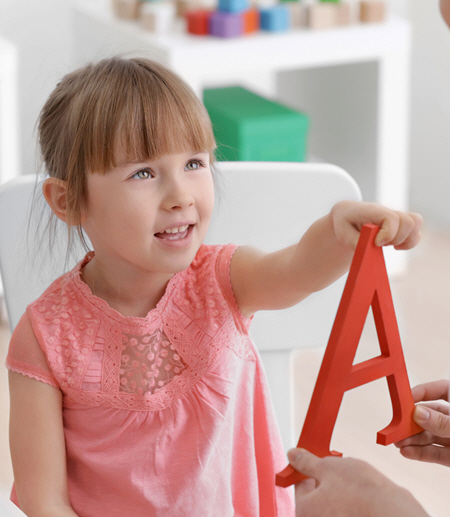Jack* is 4 years old and attends half-day preschool. He loves school, separating easily from mom at drop-off in the mornings and playing happily with his classmates. He’s very social and loves books and swinging on the playground.
However, his teachers can’t seem to fully understand him. They’ve expressed that some of the kids at school can’t understand him either. Mom and dad understand him only if they know the context of his words. When Jack can’t clearly express himself at home, he gets angry, balls his fists, and yells his words even louder. Occasionally, he will give up and just walk away.
 When kids’ speech isn’t as clear as it should be…
When kids’ speech isn’t as clear as it should be…
First, what is speech?
Speech encompasses the physical production of individual sounds. In American English, we have consonant sounds like P, B, M, T, D and vowel sound like A, E, O.
We then sequence those sounds into words like DOG, CAT, SHOE. From there, those words make up phrases and sentences which then lead to a conversation.
During speech development, kids learn their speech sounds by first babbling and then talking. It takes about years to accomplish those big talking milestones.
Along the way, your child will make a variety of sounds and sometimes even substitute sounds for each other. Some of those substitutions are considered a normal part of the development process.
We expect speech sounds to be mastered in a certain sequence within a specific timeline.
An articulation delay is when your child’s speech sounds are developing as anticipated, but they are occurring much slower than his peers.
Your child may be difficult to understand, or the quality of their speech may sound like “baby talk” compared to that of kids their age. An example would be a child that has a noticeable lisp or one who cannot say R words, therefore, saying things like, “I have a bwuthuh” instead of “I have a brother.”
An articulation disorder is when your child is using sounds that are unusual or unexpected. It deviates from what researchers expect of typical speech development milestones.
Your child’s speech sounds could be distorted, he could substitute unusual sounds for ones he can’t pronounce, or he may drop sounds altogether. The reasoning behind this could be a number of things such as poor muscle coordination in his mouth, a hearing loss, or not having the attention or awareness to use correct speech sounds.
Many kids have either a speech delay or a speech disorder. For others, they might have both. Sometimes it is difficult to distinguish between the two if clients come to see me with a very severe pronunciation struggle. Regardless of the root of the problem, we can work to find a way to help your child improve his talking skills.
If your child doesn’t receive the help he needs, your child may experience the following: frustration, anxiety, loss of confidence; struggling to make or keep friends, isolation, and even an inability to become independent due to needing someone else to interpret his words.
 Connection at such a young age is vital for development.
Connection at such a young age is vital for development.
As humans, we connect through communication the minute we are born. Parents interpret their infant’s crying as a need for food, comfort, or a diaper change.
As your baby grows, their communication skills develop and become more complex. We start to understand them more and more as their language increases. With that, our love and our parent-child bonds become stronger each day.
Our hope as parents is that we can meet our child’s needs immediately when it is communicated to us. The power of connection brings us all together.
Here’s what we’ll do to improve your child’s pronunciation…
Yes, there will be work involved. We’ll make some goals on the sounds that need improvement, and your child will need to work on how to make those sounds correctly.
I provide my kids with homework, so they can practice beyond the time we spend together. Kids who work on their homework outside of therapy improve much better and faster than those who don’t.
Patrick* began speech therapy when he was 24 months old, because he did not have any words whatsoever. He received speech therapy from his public school until the first grade.
His mom called me to work with him the summer before second grade. He still tended to drop sounds in the middle of words and the ends of words. Mom told me he was being bullied at school for talking like a baby.
I worked with Patrick every week until the end of that year. Patrick worked really hard on mouth exercises and drills that I showed him. We played memory games, told jokes, and read some books all while working on his speech sounds.
When December of that year rolled around, he was ready for his speech graduation. It was the best holiday present for Patrick and his family.
 Your child is seeing the world with wonder and amazement…
Your child is seeing the world with wonder and amazement…
…and they want to share those experiences with you with their words.
If you are ready to share those bonding moments with your child, give me a call. I offer a free 20-minute consultation to get to know you and your child’s needs.
When it comes to your child’s speech development, being proactive at an earlier stage guarantees more positive change. Otherwise, speech impediments could become long-lasting.
There could be a chance that they outgrow it. But sometimes, waiting is detrimental to your child’s overall growth and well-being. As time goes on, speech sounds become ingrained. Taking early action when it comes to your child will be more beneficial in the long run.
Let’s improve your child’s speech skills so you can fully enjoy those bonding moments. Give me a call today: (720) 808-0450.

